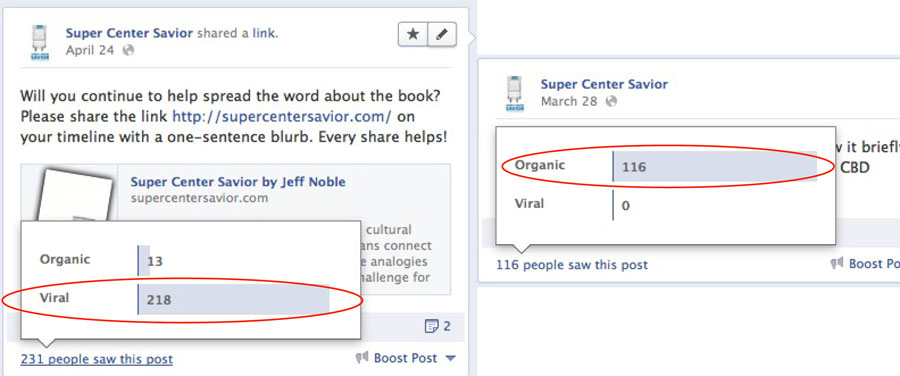I get teased occasionally by how my Facebook page and Twitter account regularly are used for “pimping” the book. I always feel funny about it, honestly.
My intent is not to “preach to the choir.” I know (or hope) that most of my friends, family and church members have bought a book. What self-published authors (or any creative who has produced without the help of an agent) needs is HELP. When I post on Facebook or tweet, the strategy is not just to reach a random person from my own account. The hope is that YOU will repost, share or retweet (RT) from your account. That’s how the word spreads.
Take for example Facebook’s new administrative reporting. They recently changed their coding so that you could see how a post is viewed: either as “Organic” or “Viral.” Here are their definitions for each:
- Organic reach: The number of unique people who saw this post in News Feed, ticker or on your Page.
- Viral reach: The number of unique people who saw this post from a story published by a friend. These stories can include liking, commenting or sharing your post, answering a question or responding to an event. (Source)
Here’s proof:
In one post above on the left (dated April 24), I explicitly asked people to share the link. Several people copied the link and made their own post. Two other people shared the link by clicking the “Share.” (See the “2”?) The post on the right (dated March 28) was simply a request to review the book on online websites, so it wasn’t shared or reposted by anyone. Notice the Viral reach of the one post compared to the other.
What does that mean?
It means that when YOU repost, share, retweet, it HELPS. It gets my content beyond my small circle of friends on Facebook or followers on Twitter into your small circle. All those circles of influence add up.
It’s a simple and powerful way to help promote for an author, musician or other creative. So the next time you read a post or tweet, take a few extra seconds, and lend your digital influence.
For more reading about Facebook’s Viral vs Organic methodology, check out this entry from Savvy Blogging.

